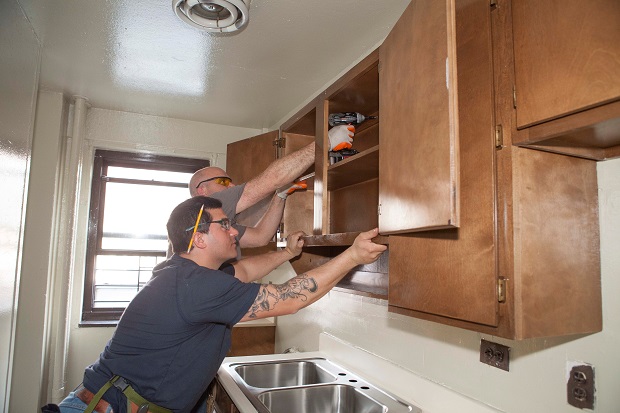Skilled Trades, Work Order Reform Pilot Underway in Queens
NYCHA residents at four Queens developments may start to notice faster repairs and fewer delays with skilled maintenance jobs, as well as a more efficient work order process, under a new pilot program that has taken effect in the community.
The Authority’s Skilled Trades Pilot Program – which launched in late October at Astoria Houses, Ravenswood Houses, and Queensbridge North and South Houses – decentralizes skilled trades jobs by stationing the workers at a specific development. Skilled workers are those who perform specialized repairs in apartments, including painters, plasterers, carpenters, plumbers, and electricians.
Along with the decentralized system, the pilot revamps NYCHA’s work order process, requiring that all necessary work orders for a resident’s request be made simultaneously on-site during the first maintenance visit. This means that residents can schedule all of their appointments in a single phone call. In the former system, the next step in the repair process was only scheduled once the previous step was completed.
Through this decentralization, the program aims to create more transparency and shorter wait times for NYCHA residents who have requested repairs. NYCHA Program Manager Meagan Patrick said the pilot will improve the accountability and responsiveness for the work that is conducted.
“By geographically empowering our workforce, you’re able to get more work orders done and you minimize any time that’s spent traveling,” she noted. “We’re also changing the way that performance gets measured.”
In its first week of operation, the pilot program already reported progress in several areas, including a 19-percent increase in productivity for skilled trades projects throughout the four properties. There were 788 total tasks completed during the week, and they were completed in fewer days.
Having the skilled workers dedicated to a particular site instead of being borough-based eliminates their travel time between developments, resulting in fewer service delays. It also allows them to become part of the development’s community, where they will get to know the residents and learn the unique needs of the property. Painters, plasterers, and carpenters will be on-site five days a week, while electricians and plumbers will be stationed up to three days per week.
“It’s better for everyone: it’s better for the residents because they know who’s coming into their apartment; it’s better for the property managers because they’re able to hold someone accountable; and it’s better for the workers because they like going to one site and forming those relationships with property management staff,” Ms. Patrick said.
Painter Bekar Iosava, who is based at Queensbridge South, can attest to the new and improved setup for skilled trades employees. Mr. Iosava said that working out of the same location each day has its share of advantages.
“I know how perfect this pilot program is because every day when you come to one place, it makes you very comfortable,” Mr. Iosava said. “When you go to the same place every day, the people know you.”
Congresswoman Carolyn Maloney, whose district includes the four Queens developments, said she has long been an advocate for decentralizing the work order process, and is “thrilled” that NYCHA is moving forward with a program to address concerns about service delays.
“With this new decentralized system, I am hopeful that maintenance issues will be addressed more quickly, and that NYCHA and its residents will be able to communicate more effectively,” Rep. Maloney said.
“In the past, skilled workers were assigned to the development; you knew who they were, you were familiar with them and they were familiar with you,” said Donna Gibson, who has lived at Ravenswood for 45 years. “[The pilot] is like a renewal; it’s bringing back something that was practiced years ago, and it’s a great thing.”
The work order reform effort was the result of two years of meetings with residents and was developed as part of the NYCHA Blueprint for Change’s Transformation Plan, which seeks to improve how the Authority delivers services to residents.
Astoria Houses Resident Association President Claudia Coger believes the decentralized skilled trades system is needed now more than ever, and said residents seem excited to have a plan to resolve outstanding repair requests. The 22-building development has already experienced progress in regard to that issue, she noted.
“The tickets are being addressed much quicker than before,” said Ms. Coger, who has lived at Astoria for 65 years.
NYCHA plans to implement the pilot in Queens through the end of this year before eventually rolling it out to the remainder of its portfolio across the five boroughs by the end of 2021.
Featured photo: (pre-COVID-19 photo)

